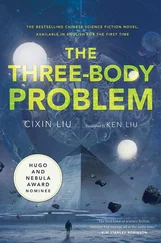“Adjust to a hundred thousand times,” the lieutenant colonel said.
Still they saw a smooth mirror.
“A million times.”
A smooth mirror.
“Ten million times.”
Macromolecules would be visible at this magnification, but what they saw on the screen remained a smooth mirror without the slightest sign of roughness, no difference in smoothness from the surrounding unmagnified surface.
“Push it up again!”
Xizi shook her head. This was the electron microscope’s highest level of magnification.
More than two centuries before, in his novel 2001: A Space Odyssey, Arthur C. Clarke had described a black monolith left on the moon by an advanced alien civilization. Surveyors had measured its dimensions with ordinary rulers and had found a ratio of one to four to nine. When these were rechecked using the most high-precision measurement technology on Earth, the ratio remained an exact one to four to nine, with no error at all. Clarke described it as a “passive yet almost arrogant display of geometrical perfection.”
Now, humanity was facing a far more arrogant display of power.
“Can an absolutely smooth surface really exist?” Xizi gasped.
“Yes,” Ding Yi said. “The surface of a neutron star is nearly absolutely smooth.”
“But this has a normal mass!”
Ding Yi considered this, then looked about him. “Hook up to the spaceship computer and find the spot that the robot arm gripped during capture.”
This was accomplished remotely by a fleet surveillance officer. The Mantis computer projected thin red laser beams to mark the position on the droplet surface that had been gripped by the steel claw. Xizi examined one of the spots with the microscope, and at a magnification of ten million times, she still saw a smooth, flawless mirror.
“How high was the pressure at the point of contact?” the lieutenant colonel asked, and soon received a reply from the fleet: approximately two hundred kilograms per square centimeter.
Smooth surfaces are easily scratched, but the strong metal clamp did not leave any scratches on the droplet’s surface.
Ding Yi floated away in search of something within the cabin. He returned with a rock pick, perhaps dropped in the cabin by someone during collection of rock samples. Before anyone could stop him, he slammed it forcefully into the mirror surface. There was a clang, crisp and melodious, like the pick had smashed into jade-paved ground. The sound traveled through his body, but the other three didn’t hear it because of the vacuum. With the handle of the pick, he pointed out the spot he had struck, and Xizi examined it with the microscope.
At ten million times magnification, it was still a smooth mirror.
Ding Yi tossed the pick aside dejectedly and looked away from the droplet, deep in thought. The eyes of the three officers, and the eyes of the million people in the fleet, were all focused on him.
“All we can do is guess,” he said, looking up. “The molecules in this thing are neatly arranged, like an honor guard, and they’re mutually solidifying. Do you know how solid it is? It’s as if the molecules are nailed into place. Even their own vibrations are gone.”
“That’s why it’s at absolute zero!” Xizi said. She and the other two officers understood what Ding Yi was getting at: At normal densities of matter, the separation between atomic nuclei is quite large. It would be no easier to fix them all in place than it would be to join the sun to the eight planets with rods to form a stationary truss.
“What force would allow that?”
“There’s only one option: strong interaction.” [4] Translator’s Note: Strong interaction is the strongest of the four fundamental interactions, and is responsible for the strong nuclear force that binds together subatomic particles. It is roughly 100 times more powerful than electromagnetism, but is only effective at distances of less than a femtometer.
Through his visor, it was obvious that Ding Yi’s forehead was covered in sweat.
“But… that’s like shooting the moon with a bow and arrow!”
“Indeed, they’ve shot the moon with a bow and arrow…. The tear of the blessed mother?” He gave a chilly laugh, a mournful sound that made them shiver, and the three officers knew what it meant: The droplet wasn’t fragile like a tear. Entirely the opposite: Its strength was a hundred times greater than the sturdiest material in the Solar System. All known substances were as fragile as paper by comparison. It could pass through the Earth like a bullet through cheese, without even the slightest harm to its surface.
“Then… what’s it here for?” the lieutenant colonel blurted out.
“Who knows? Maybe it really is just a messenger. But it’s here to give humanity a different message,” Ding Yi said, turning his gaze away from the droplet.
“What?”
“If I destroy you, what business is it of yours?”
The words were followed by a momentary silence as the three other members of the expeditionary team and the million members of the combined fleet ruminated over their meaning. Then, all of a sudden, Ding Yi said, “Run.” The word was uttered softly, but then he raised his hands and shouted hoarsely, “Stupid children. Run!”
“Run where?” Xizi asked in fright.
Just seconds after Ding Yi, the lieutenant colonel realized the truth. Like Ding Yi, he shouted desperately: “The fleet! Evacuate the fleet!”
But it was too late. Powerful interference had already wiped out their communication channels. The image being transmitted from Mantis vanished, and the fleet was unable to hear the lieutenant colonel’s final call.
A blue halo emerged from the tip of the droplet’s tail. It was small at first, but very bright, and cast a blue shroud over its surroundings. Then it dramatically expanded, turning from blue to yellow and finally to red. It almost seemed as if the droplet wasn’t producing the halo, but had just drilled out from within it. The halo weakened in luminosity as it expanded, and when it had reached a diameter twice that of the largest part of the droplet, it vanished. The instant it vanished, a second small blue halo emerged from the tip. Like the first one, it expanded, changed color, weakened, and quickly disappeared. The halos continued to emerge from the droplet’s tail at a rate of two or three a second, and under their propulsion, the droplet began to move forward, and then rapidly accelerated.
But the four members of the expedition team never saw the second halo emerge, because the first one was accompanied by ultra-high temperatures approaching that of the sun’s core, which vaporized them instantly.
The hull of Mantis glowed red, resembling from the outside a paper lantern whose candle had just been lit. Its metal body melted like wax, but no sooner had the ship begun to melt than it exploded, dispersing into space as an incandescent liquid with hardly any solid fragments left behind.
From a thousand kilometers away, the fleet had a clear view of Mantis ’s explosion, but the initial analysis was that the droplet had self-destructed. Everyone felt sorrow for the sacrifice of the four expedition team members, followed by disappointment that the droplet was not a messenger of peace. But the human race did not have even the slightest bit of psychological preparation for what was about to happen.
The first anomaly was identified by the fleet’s space surveillance computer, which discovered during the course of processing images of Mantis ’s explosion that one of the fragments was abnormal. Most of the pieces were molten metal that flew uniformly through space following the explosion, but this one was accelerating. Of course, only a computer was able to find a tiny object among the massive quantity of flying fragments. From an immediate search of its database and knowledge bank, which included an enormous amount of information on Mantis, it arrived at several dozen possible explanations for the peculiar debris, but none was correct.
Читать дальше












